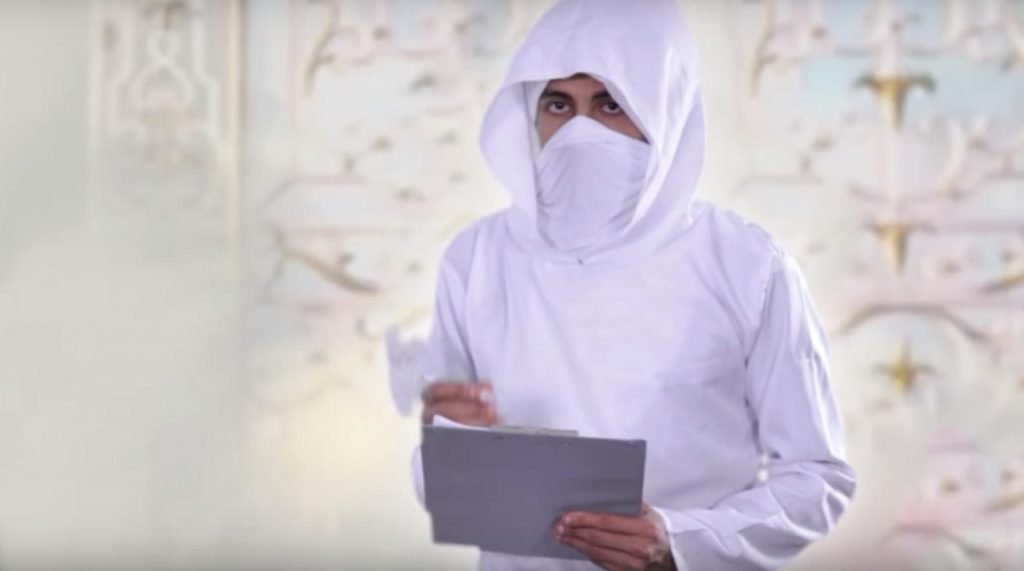Egyptian atheists: Caught between Dr Jekyll and Mr Hyde
By Khaled Diab
Atheists in Egypt have been enjoying greater public acceptance, but their increased visibility has also resulted in controversy, shrill panic and a growing tide of prosecutions.

Thursday 24 May 2018
For those who do not believe in divine judgement, a worldly reckoning can sometimes await them. This is the case for the controversial atheist and daring YouTuber Sherif Gaber who is caught in a sort of secular purgatory.
The prominent Egyptian human rights lawyer and activist Gamal Eid informed me that his organisation, the Arabic Network for Human Rights Information (ANHRI), had managed, on Monday 7 May, to help secure Gaber's release from Cairo airport, where he had been unlawfully detained since the previous Wednesday because no official arrest warrant had been issued for him.
After his official release, Gaber vanished. He tweeted that, after four days “in hell”, he was “free”, but he failed to give details about his situation, leading to fears that he has been disappeared and that the security services had somehow taken over his Twitter account.
Even now that Gaber is presumed to be free, he is not actually free. In addition to being out on bail from an earlier trial, a new case has been brought against him. The young freethinker originally entered the public eye as a student at Suez Canal University following a smear campaign in 2013 by faculty members who did not approve of his views supporting homosexuality and criticising religion. As is often the case during such incidents, the case was as much, if not more, about questioning worldly authority than about doubting divine authority.
Following his sentencing on blasphemy charges in 2015, Gaber was released on bail pending a retrial. He went underground but courageously refused to be silenced. He dedicated himself to producing YouTube videos, some of which employ biting satire, the latest of which features two credulous missionaries trying to persuade a sceptic to convert to their imaginary religion, which bears a remarkable resemblance to Islam.
These videos have won him many fans amongst Egyptian and Arab non-believers and sceptics, but they have also provoked the ire of Islamists and conservatives. This came to a head late last month when a lawyer representing the ultra-conservative salafist Nour party brought a suit accusing Gaber of contempt of religion. This, along with threats he had been receiving, spooked Gaber and finally led him reluctantly to abandon his admirable commitment to stay in Egypt in spite of the risks, which was founded on the conviction that promoting freedom of thought “would have a more powerful effect to do it here, where we're born and raised”.
“I suspect that he has been banned or will be banned from travelling abroad,” notes Gamal Eid, “but he will not know until he actually tries to travel.”
Gaber's case underlines what I call Egypt's Jekyll-and-Hyde attitude towards atheism. Since the revolution which engulfed the country in 2011, atheists, both young and old, have (re-)emerged from the shadows and taken on a more assertive public profile.
Atheists not only possess a strong presence on social media but have also appeared regularly on television to explain their thinking and to demand equal rights. There, they have often had to struggle against hostile interviewers, enormous prejudice and immense ignorance of what atheism actually is and means.
At its best, this greater openness and presence has led to a greater public acceptance of and tolerance towards the a-religious in society, even amongst some conservative Muslims. My personal experience has been a largely positive one – but this is liable to change at any moment. I have been writing about atheism and being an atheist for well over a decade now, I won a prestigious award for an essay I wrote on Arab atheists and the longest chapter in my new book, Islam for the Politically Incorrect, is dedicated to the topic.
In my book, I challenge the simplistic and ignorant views of both Muslim and Western bigots regarding the status of unbelievers and the rich history of atheism and scepticism in the Islamic context. Contrary to conservative myth, there is nothing new about atheists and sceptics in the Islamic tradition.
In fact, there have been plenty of them, especially during the so-called Golden Age of medieval Islam and in modern times. This ancient tradition reveals itself in how Muslim atheists draw inspiration from their own history, not just western tradition. An example of this is Sherif Gaber's video, ‘Muslim Meets God‘. In the video, a young man stands at the gate to heaven but all his superstitions about the pious acts and pronouncements required to enter this rational version of paradise prove untrue and unfounded.
To my eyes, Gaber appears to have drawn inspiration from one of the ‘spiritual' forefathers of Arab atheists, Abu al-Ala' al-Ma'arri (973-1057), who penned The Epistle of Forgiveness, in which a bigoted sheikh is sent on a fantastical journey to paradise and hell. In this version of the aferlife, heaven is populated by pagan and irreverent poets and philosophers. Centuries later, al-Ma'ari's Epistle influenced numerous secular Arab thinkers, including Iraqi poet, reformer and atheist Jamil Sidqi al-Zahawi (1863-1936) who published, in 1931, Revolution in
Hell, in which freethinkers condemned to hell storm paradise and claim it as their rightful abode.
At its worst, the more visible public profile of atheists in Egypt has resulted in shrill panic towards the atheism “tsunami”, mob rule, moral denunciation of atheists as “Satan worshippers” or mentally deranged, a government-sanctioned national plan to combat atheism spearheaded by Al Azhar, the foremost institute of Sunni orthodoxy, Islamist law suits and a regular stream of prosecutions, even though Egypt does not technically ban atheism.
This societal polarisation is reflected in Egypt's confused legal framework. For example, Article 64 of the current constitution states that “freedom of belief is absolute”. However, Egypt's penal code contains a number of clauses which effectively outlaw ‘blasphemy'. The vaguest of these is Article 98(f), which was originally passed in 1981 to protect religious minorities, but has been, in recent years, weaponised by Islamists and the state to target Christians, secular critics and atheists.
This ambiguity has left non-believers in a precarious situation, at mercy to the whims of individuals in Egypt's labyrinthine and powerful security apparatuses, prosecutors' offices and judiciary. This explains how it is possible that the worst I have so far encountered, aside from occasional online vitriol, is once, during an interrogation, to have been questioned about my religious convictions. The intelligence officer interviewing me expressed fascination and curiosity about the difference between agnosticism and atheism, while seemingly far more concerned about my negative opinions of President Abdel-Fattah al-Sisi. His insistence that he was “really enjoying our conversation” served more to unsettle than to reassure me.
Simultaneously, some other atheists, from Sherif Gaber to Alber Saber, have been prosecuted or persecuted, pursued by lawyers and prosecutors or pursued by vigilantes, tried in the courts or tried by the media, tortured in detention or tormented by the public, imprisoned in a jail cell or condemned to solitary societal confinement, not to mention exiled within or outside Egypt.
The future for atheists in Egypt is uncertain. The Sisi regime, which intensely dislikes all forms of dissent, may have won accolades in the West for its reformist claims but, in reality, it is juggling a dual image both as the guarantor of freedom of belief and the moral protector of Egypt's Islamic identity.
When the Muslim Brotherhood was deemed Public Enemy Number One, it was useful for the regime to flaunt its secular credentials. But a key ally in this battle were the even more conservative salafists, and now they expect payback. This tension is playing itself out in Egypt's largely fig-leaf parliament, where there have been motions both to repeal Egypt's blasphemy laws and, more recently, to outlaw atheism.
As it heads into the unknown, I hope Egypt will follow the lead of Muslim-majority countries like Albania, where freedom of belief is truly absolute, rather than Iran or Saudi Arabia, where atheism and secularism are defined as forms of “terrorism” and atheists are routinely jailed and even executed.
—-
This is the extended version of an article which first appeared in The New Arab on 17 May 2018.

